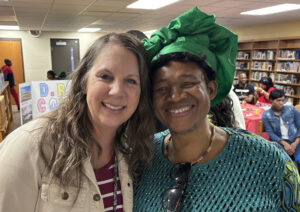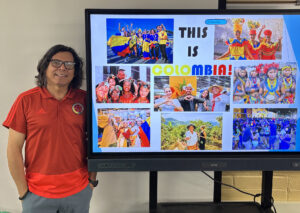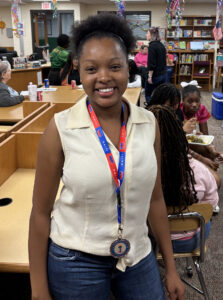
MONROVIA — Oscar Agudelo has lived in Mooresville since 2022. Before he moved there, he was a lawyer in his native Colombia, down in South America.
What brought him thousands of miles from home to Morgan County, Ind.?
“Love,” Agudelo says, a big smile on his face.
Back in 2019, Agudelo wanted to learn English, so he turned to the popular mobile app, HelloTalk. The app allows users to learn a new language by connecting them with another person who both knows the language, and is interested in learning the language of the first user. In Agudelo’s case, he connected with an English speaker named Rebecca from Indianapolis who was interested in learning Spanish from him.
Agudelo and Rebecca started off six years ago practicing simple grammar with each other. One thing led to another — the subject and the verb agreed — and after three short years, the two were married and had a baby.
Agudelo has come a long way since downloading HelloTalk on his phone six years ago. On May 21, he found himself inside the library at Monrovia Middle School, celebrating graduation with dozens of other immigrants from Monrovia’s adult English as a second language (ESL) program.
Monrovia’s ESL program currently has 23 students — with a few more on the waitlist — and twice a week throughout the school year, adult immigrants make their way to the school where they practice learning English for hours after long days at work.
These immigrants come from all over. Agudelo is Colombian, but many of the students come from Haiti and elsewhere, like the Democratic Republic of the Congo and Cameroon. Each one has a story about why they left their home countries, and what they hope to achieve here in the United States.
Last week’s end of the school year party in Monrovia comes during an interesting period in American politics, as the students celebrated both their own cultures and American culture at a time when immigration — and debates about how much of it the U.S. should have — is at the forefront of the national conversation.
Inside the library were tables set up with food from the students’ countries of origin, alongside a table representing the United States. At Cameroon’s table, you could eat Eru — a vegetable soup made up of finely shredded leaves and fish — or Ndole, a dish consisting of stewed nuts, bitter leaves indigenous to West Africa and beef.
And at the American table, students could enjoy popcorn, macaroni and cheese, and of course, apple pie.
But the immaculate feast and the merriment existed alongside something tense, which culminated in a brief aside between The Correspondent and Amy Swafford, one of the teachers in Monrovia’s ESL program. After talking about something else, Swafford had a thought, and sprang into action. She went around asking everyone if it was OK to put their names and faces in the newspaper.
“I don’t know!” Swafford said, a little flustered. “I don’t want anyone to get taken away.”

Peace in Monrovia
Darine Saint-Cyr, a medal around her neck, came to this country from Haiti a year ago. Last Friday, she graduated from Monrovia High School.
She hasn’t decided yet what the next chapter of her life will be — she says she “likes too many things” — but after going through Monrovia’s ESL program, she’ll have a lot of options.
When Saint-Cyr arrived in America, she didn’t speak a word of English, but now she speaks it better than a lot of native born U.S. citizens. She sings it better, too — Saint-Cyr was a member of Monrovia’s Shooting Stars show choir.
Her father came to America last year looking for work, and Monrovia has quickly become home.
“Monrovia is very peaceful, and quiet,” Saint-Cyr says. “Sometimes too quiet,” she adds with a laugh.
But she loves living here, calling the one-square-mile town a “beautiful place.” It’s a sentiment shared with her fellow Haitian, Wesner Festin, an adult student in Monrovia’s program.
Festin and his family arrived from Haiti in 2022, fleeing what he called the “crisis in politics” back home. In recent years, Haiti’s government has undergone total collapse, and gang violence is rampant throughout the country. The situation became so dire that Festin, an accountant and the pastor of a church with more than a thousand members, felt compelled to leave it all behind for a chance in America.
Festin would like to be an accountant here, and with the English he’s learning in class, he hopes to eventually go back to school. Unprompted, he says he knows a lot of people are worried about the current president, but he doesn’t count himself among them — Festin knows what it’s like to survive hardship.
Festin did say that if things were to stabilize back in Haiti, he thinks he would take his family back home. For now, though, he’s enjoying peace in Monrovia, and trying to learn English, which he said he finds very difficult.
He isn’t alone. The students in Monrovia’s program are at a variety of skill levels. Agudelo and Saint-Cyr now speak English fluently, while one student, Madeline Madiya, is still learning the ropes.

Madiya moved to America last November from the Congo, and she works as a server in the cafeteria at Monrovia Middle School. Swafford said Madiya sometimes gets frustrated if she doesn’t know how to say something, but during her interview with The Correspondent, Madiya flashed a big smile and did the best she could.
The day following the party, The Correspondent received a voicemail from Agudelo. He relayed some concerns: After he told his wife what he’d said to this reporter, she feared people would get the wrong idea. Agudelo wanted it made clear that he married his wife not as some attempt to get U.S. citizenship, but because he loved her and wanted to do right by her as the father of her child.
“At this moment, we’re in a situation in this country with a lot of hate towards immigrants,” Agudelo said, asking that his story be communicated clearly to avoid any misunderstandings.
In a follow-up phone call, Agudelo reaffirmed that he is currently a legal resident on the pathway to citizenship. The Correspondent assured him that his story would be told truthfully and with care.
With that, we hung up the phone, both of us going about our separate ways in peaceful Morgan County, both of us hoping for the same chance to make it in the United States of America.








